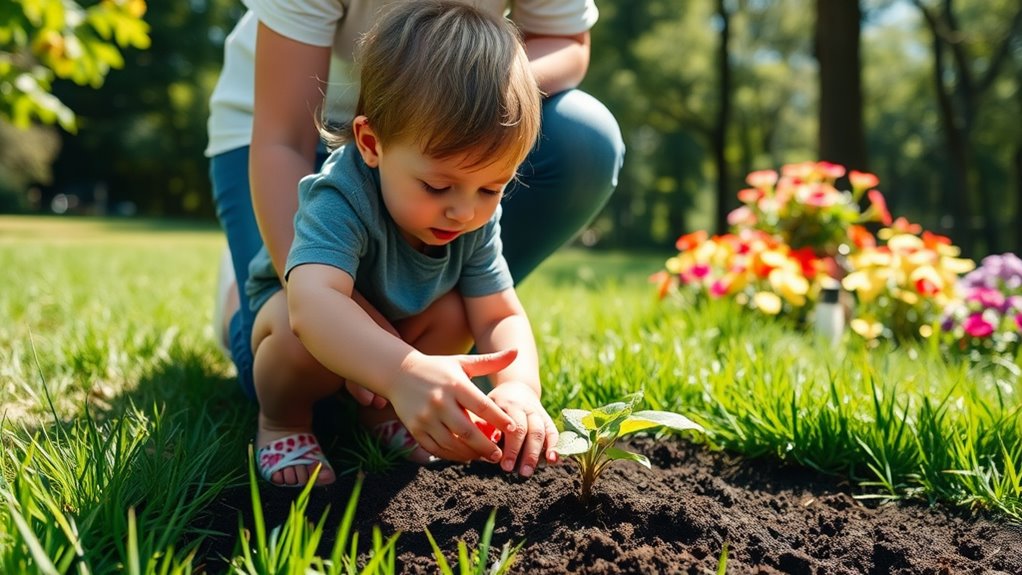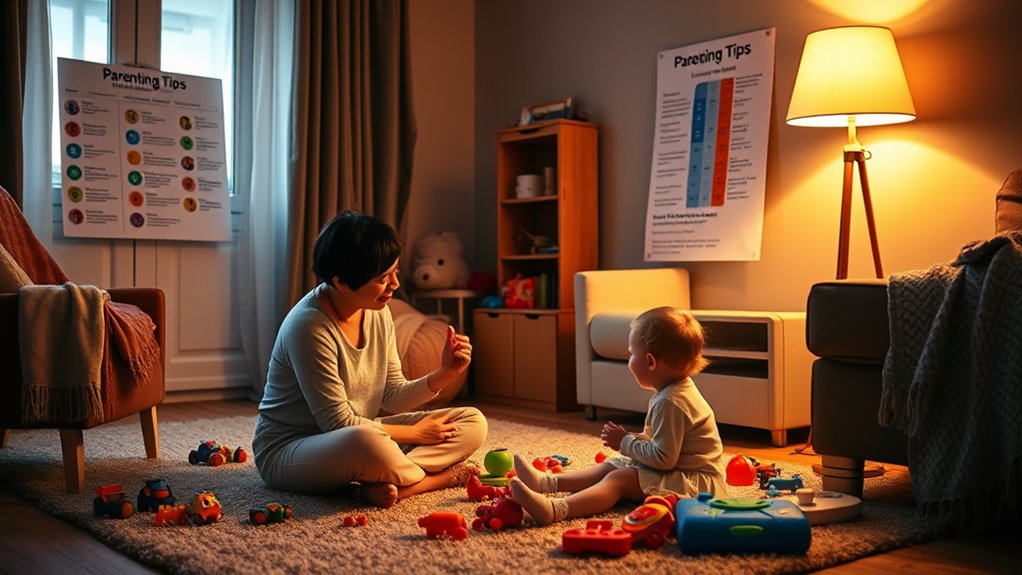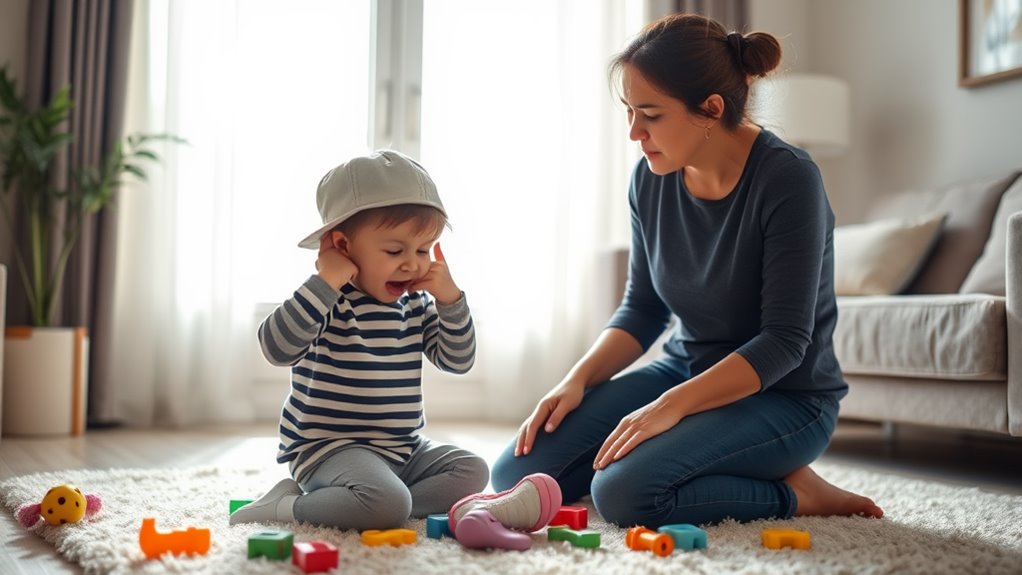10 Life Lessons Every Parent Should Teach Their Kids
As a parent, it’s vital to teach your kids key life lessons that will shape their future. Start with kindness and empathy; these values foster compassion and emotional intelligence. Encourage responsibility and honesty, helping them learn accountability for their actions. Emphasize that failure is a stepping stone to growth, cultivating resilience along the way. Teach them basic money management skills to build financial literacy. Lastly, stress the importance of healthy relationships and setting personal boundaries. These lessons create a solid foundation for their development. If you stay curious, there are even more insights waiting to be explored.
Key Takeaways
- Teach the value of kindness and empathy through simple acts and community service to foster emotional intelligence and compassion.
- Instill responsibility and honesty by encouraging accountability for actions and emphasizing the importance of truthful communication.
- Embrace failure as an opportunity for growth, helping kids learn resilience and problem-solving skills from their setbacks.
- Educate children on money management basics, including budgeting, saving strategies, and distinguishing between needs and wants.
- Establish emotional boundaries and encourage open expression of feelings to promote healthy relationships and self-advocacy.
The Value of Kindness
In a world that often feels rushed and competitive, practicing kindness can be a powerful tool for connection. You mightn’t realize how simple acts of kindness, like holding the door open for someone or giving a compliment, can brighten someone’s day. These random acts of kindness create ripples of positivity that extend far beyond the moment.
Encouraging your kids to participate in kindness projects can instill a sense of empathy and community. Whether it’s organizing a food drive or making cards for residents in a nursing home, these projects teach them the importance of giving back. They’ll learn that kindness isn’t just an act; it’s a mindset that can transform their interactions and relationships.
Furthermore, kindness helps kids develop emotional intelligence. When they see the joy their actions bring to others, they cultivate a deeper understanding of feelings, which is vital for building meaningful connections.
So, why not start small? Challenge your family to perform one random act of kindness each week. You’ll not only strengthen your bond with each other but also contribute to a more compassionate world.
Importance of Responsibility
Taking ownership of our actions is crucial for personal growth and development. When you teach your kids about responsibility, you’re preparing them for life’s challenges.
Responsibility fosters personal accountability, helping them understand that their choices have consequences. By embracing this lesson, they’ll learn to trust themselves and make better decisions.
Here are some essential aspects of responsibility to emphasize:
-
Task Delegation: Encourage them to delegate tasks when necessary, whether it’s in group projects or daily chores. This helps them learn teamwork and accountability.
-
Ownership of Mistakes: Teach them that it’s okay to make mistakes, but it’s important to own up to them and learn from the experience.
-
Setting Goals: Help them set realistic goals and track their progress. This instills a sense of responsibility towards achieving what they’ve committed to.
-
Time Management: Show them how to prioritize tasks and manage their time effectively. This skill is vital for balancing responsibilities and personal interests.
Embracing Failure as Growth
Everyone faces setbacks at some point, and teaching kids to embrace failure as a stepping stone to growth is essential. Instead of instilling a failure mindset, encourage them to view mistakes as growth opportunities. Let them know that everyone stumbles, but what matters most is how they respond to those challenges.
When your child encounters failure, remind them that it’s a natural part of life. Help them analyze what went wrong and what they can learn from the experience. This reflection fosters resilience and problem-solving skills, both crucial for their development.
Celebrate their efforts, regardless of the outcome, to reinforce that trying is just as valuable as succeeding.
You can also share stories of famous figures who faced failures yet transformed those experiences into triumphs. This helps them see that setbacks can lead to better paths and outcomes.
Cultivating Empathy and Compassion
How can we teach kids the importance of empathy and compassion in today’s fast-paced world? It’s essential to help them understand others’ feelings and perspectives. One effective way is to model empathy in your own actions. When kids see you practicing active listening and showing genuine concern for others, they’re more likely to mimic those behaviors.
Here are a few strategies you can use to cultivate empathy and compassion in your children:
-
Encourage open conversations: Discuss emotions and experiences, helping them develop emotional awareness.
-
Practice active listening: Teach them to listen without interrupting, showing that everyone’s feelings are valid.
-
Engage in community service****: Volunteering together can expose them to different life situations and foster compassion.
-
Read diverse stories****: Sharing books that feature various cultures and experiences can broaden their understanding of the world.
The Power of Gratitude
Gratitude can transform a child’s perspective, turning everyday moments into opportunities for appreciation. When kids learn to recognize the positives in their lives, they develop a more optimistic outlook.
You can encourage this mindset by introducing gratitude journaling. This simple practice allows your child to reflect on their day and jot down things they’re thankful for, fostering a habit of gratitude.
Start small—ask them to write down three things each day. It could be a delicious meal, a fun time with friends, or even a sunny day. Over time, they’ll learn to express appreciation for the little things that often go unnoticed.
Teach them to say thank you, not just with words but with genuine emotion. Whether it’s for a gift or a kind gesture, expressing appreciation strengthens relationships and builds a positive environment.
As they embrace gratitude, you’ll notice a ripple effect; they’ll become more empathetic and understanding. Gratitude isn’t just a fleeting feeling; it’s a powerful tool that shapes character and enhances their overall happiness.
Setting and Achieving Goals
Setting and achieving goals can truly empower kids, giving them a sense of direction and purpose. When you teach your children how to set and pursue their goals, you’re not just helping them succeed; you’re equipping them with valuable life skills.
Start by introducing goal visualization techniques, which allow them to envision their dreams clearly. This can spark motivation and make their goals feel more attainable.
Here are some effective long-term planning strategies you can share with them:
- Break down big goals*: Teach them to divide larger goals into *smaller, manageable steps.
- Set deadlines: Encourage them to establish a timeline for each step to maintain focus.
- Track progress: Help them create a system to monitor their achievements and stay motivated.
- Celebrate successes: Remind them to acknowledge their accomplishments, no matter how small, as this boosts confidence.
Understanding Money Management
Often overlooked, understanding money management is a crucial life skill for kids. Teaching them the budgeting basics can set the foundation for a secure financial future. Start by showing them how to track their income and expenses, helping them categorize needs versus wants. This will make it easier for them to see where their money goes, and they’ll learn to prioritize spending wisely.
Introduce saving strategies early on. Encourage your kids to set aside a portion of their allowance or any money they receive for special occasions. Explain the concept of a savings goal, whether it’s for a toy or a larger purchase, and help them create a plan to achieve it. This won’t only teach them patience but also the importance of delayed gratification.
Additionally, consider opening a savings account for them, so they can experience earning interest. You can even involve them in discussions about smart shopping and comparison pricing.
Developing Healthy Relationships
Building healthy relationships is essential for kids as they navigate social interactions and develop their emotional intelligence. Teaching your children the importance of trust building and effective communication can set them up for success in their friendships and future relationships.
Here are some key points to help your kids develop healthy relationships:
-
Listen actively: Encourage them to listen to others without interrupting, showing that they value the other person’s thoughts and feelings.
-
Express feelings: Teach them to share their emotions openly and respectfully, helping them articulate their needs and understand others better.
-
Practice empathy: Help them understand different perspectives by discussing various situations and feelings, fostering compassion in their interactions.
-
Set boundaries: Show them how to establish and respect personal boundaries, which is crucial for maintaining healthy relationships.
The Significance of Honesty
Honesty plays a vital role in maintaining healthy relationships, as it fosters trust and openness among friends and family. When you practice truthful communication, you create an environment where everyone feels safe to express their thoughts and feelings. This transparency strengthens bonds and helps prevent misunderstandings that can lead to conflict.
Teaching your kids the importance of honesty also instills a sense of moral integrity. They’ll learn that being truthful isn’t just about avoiding consequences but about valuing their own character and the feelings of others. This lesson will guide them throughout their lives, shaping their interactions in school, work, and personal relationships.
Encourage your children to speak the truth, even when it’s difficult. Reinforce that honesty isn’t just about big issues; it’s about everyday interactions, too. When they see you model honesty, they’re more likely to adopt that behavior themselves.
Remind them that while the truth can sometimes be challenging, it ultimately leads to stronger relationships and a clearer conscience.
Learning to Adapt and Be Resilient
Life is full of unexpected changes, and teaching kids to adapt and be resilient prepares them to face challenges head-on. By instilling these qualities, you help them navigate life’s ups and downs with confidence.
Here are some effective adaptation strategies and resilience-building practices you can share:
-
Encourage Problem-Solving: Teach your kids to approach challenges as opportunities to find solutions rather than obstacles.
-
Model Flexibility: Show them that change is a natural part of life and that adjusting plans can lead to new possibilities.
-
Foster a Growth Mindset: Help them understand that setbacks are a chance to learn and grow. Emphasize effort over perfection.
-
Create a Supportive Environment: Be there to listen and offer guidance, but also encourage independence. Let them know it’s okay to ask for help when needed.
Frequently Asked Questions
How Can I Encourage My Child to Be More Kind?
To encourage your child to be kinder, try incorporating random acts of kindness into their routine. Engage in empathy exercises together, discussing feelings and perspectives, so they learn to understand and connect with others better.
What Age Should Kids Start Learning About Money Management?
Think of money management like planting a garden. You should start teaching kids around age 5. By nurturing saving habits and introducing budgeting basics, they’ll grow into responsible adults who can cultivate their financial futures.
How Do I Teach My Child to Handle Peer Pressure?
To teach your child to handle peer pressure, use role-playing scenarios to illustrate different situations. Discussing consequences together can help them understand the impact of their choices, making it easier for them to resist negative influences.
What Strategies Help Kids Develop Resilience and Adaptability?
To help kids develop resilience, encourage problem-solving skills and emotional regulation. Let them face challenges, support their decision-making, and model coping strategies. This builds confidence, enabling them to adapt to life’s ups and downs effectively.
How Can I Model Gratitude in Daily Life for My Children?
Modeling gratitude in daily life can be simple. You can practice gratitude journaling together and establish thankful rituals, like sharing what you’re grateful for at dinner. It’ll help instill appreciation in your children.





